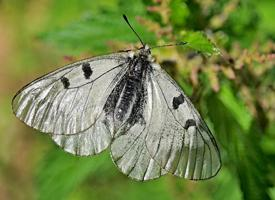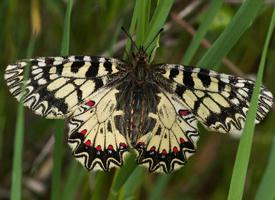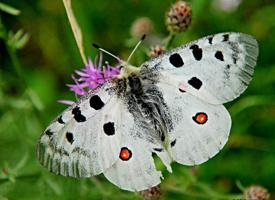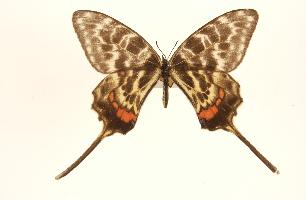
Súlyok és méretek
| Szárnyfesztávolság | 5,5-tól 7-ig cm |
|---|
Biológiai adatok
| Élettartam | 14-tól 21-ig d |
|---|
Állatleírás
The Clouded Apollo (Parnassius mnemosyne) is a captivating butterfly species belonging to the Papilionidae family, which is known for its striking and diverse array of butterflies. This species exhibits a unique blend of beauty and elegance, making it a fascinating subject for both entomologists and nature enthusiasts alike.Characterized by a relatively large wingspan that ranges between 65 to 75 millimeters, the Clouded Apollo presents a graceful appearance. The wings are predominantly white, providing a stark canvas that beautifully contrasts with the delicate patterns that adorn them. The forewings and hindwings are edged with a series of black spots and markings, which not only serve as a distinctive feature but also play a crucial role in the butterfly's survival by mimicking the eyes of larger predators to deter potential threats.
One of the most striking features of the Clouded Apollo is the translucent quality of its wings. This translucency is especially pronounced when the butterfly is basking in sunlight, creating an ethereal glow that enhances its otherworldly appearance. The body of the Clouded Apollo is slender and covered in fine scales, with colors that harmonize with the wings, typically ranging from a soft gray to a muted black, further accentuating its delicate beauty.
The habitat of the Clouded Apollo is as diverse as its appearance, with a preference for open, sunny areas that are rich in flowering plants. These habitats include meadows, woodland clearings, and grassy hillsides, primarily across Europe and Asia. The butterfly has a particular fondness for regions that offer an abundance of nectar-rich flowers, which are crucial for its survival. The larvae of the Clouded Apollo feed on various species of plants, with a preference for those belonging to the genus Corydalis and other related genera.
The life cycle of the Clouded Apollo is a fascinating process, beginning with the laying of eggs on the host plants. Upon hatching, the caterpillars feed voraciously on the leaves, undergoing several molts before pupating. The chrysalis stage is a time of transformation, where the caterpillar metamorphoses into the adult butterfly, ready to continue the cycle of life.
Despite its beauty, the Clouded Apollo faces several threats that have led to a decline in its populations in certain areas. Habitat loss, due to agricultural expansion and urban development, poses a significant threat to this species. Additionally, climate change and the use of pesticides have also contributed to the challenges faced by the Clouded Apollo, making conservation efforts crucial for its survival.
In conclusion, the Clouded Apollo (Parnassius mnemosyne) is a remarkable butterfly that captivates with its ethereal beauty and intricate patterns. Its presence enriches the biodiversity of its habitats, making it a vital species for the ecosystems it inhabits. Protecting the Clouded Apollo and its natural environment is essential for ensuring that future generations can continue to marvel at this exquisite butterfly.
Hasonló állatok
Új állatfotók
Top 10 állat
- Dolphin gull (Leucophaeus scoresbii)
- Japanese macaque (Macaca fuscata)
- Stone loach (Barbatula barbatula)
- Russian tortoise (Testudo horsfieldii)
- Galápagos tortoise (Geochelone nigra complex)
- Greek tortoise (Testudo graeca)
- Diana monkey (Cercopithecus diana)
- Common flying dragon (Draco volans)
- Moustached guenon (Cercopithecus cephus)
- Galápagos penguin (Spheniscus mendiculus)


